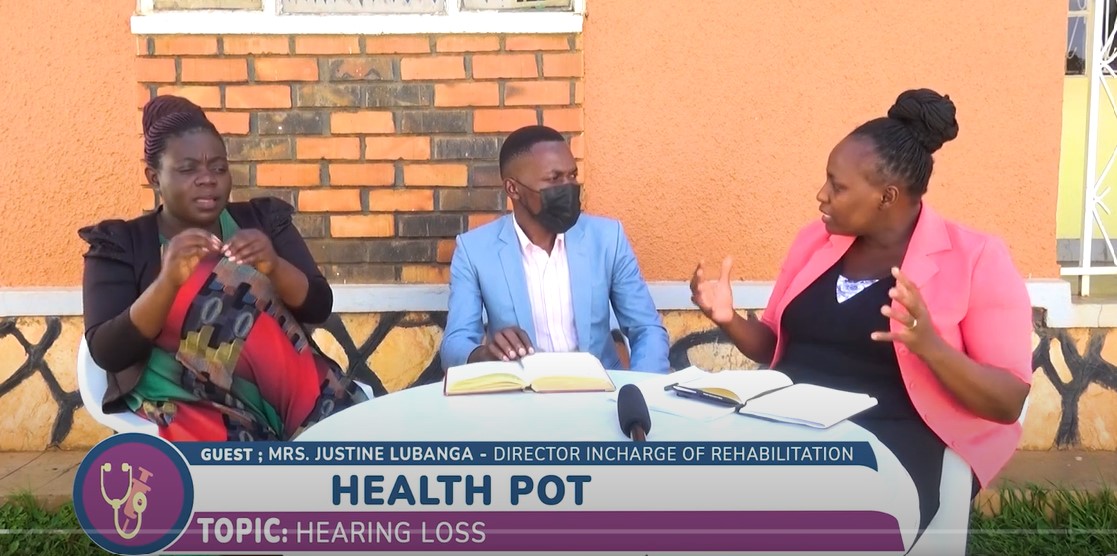
Show Host: A very good evening to you our viewers. We are glad your eyes are still on the Church of Uganda Family TV and you are watching Health Pot. We are glad that all the time you are always waiting for us. This program is brought to you by Makerere University School of Public Health together with Church of Uganda Family TV, and we look at early childhood development, maternal health, and other public health concerns. Edrine Osteen Mukalazi is my name. This whole month, we are talking about hearing loss.
As we all know that the 3rd of March was World Hearing Day, so we dedicated this entire month to talking about hearing loss and what you need to know or what you didn't know about why someone can hear or can lose their hearing.
Today we are blessed to have Mable Mulungi our sign language interpreter and Justine Lubanga going to share with us detailed information about hearing loss. Before I introduce her to the topic she will, first of all, say hi to us. Justine, we are delighted to have this evening on Family TV and Health Pot, kindly greet our viewers.
Justine Lubanga: Thank you so much. Good evening our viewers, my name is Justine Lubanga. I am the Director of Rehabilitation Services at Hear His Voice Uganda, a nongovernmental organization that engages in rehabilitating, offering comprehensive rehabilitation services to children and individuals with hearing loss that are using technology, for example, cochlear implant and hearing aids.
Show Host: Well, thank you so much! We understand the theme of this year's World Hearing Day was "Hear for Life and Listen with care" and we want to get into the details of Hearing because like you have told us that you are in the department of Rehabilitation. One time we visited this place and interacted with very many children here and we were so pleased, we were so excited about the work that goes on here.
Today we want you to tell us what rehabilitation is, and why you need to rehabilitate. Out there when you talk about rehabilitation people think it’s only people who have addictions that should be rehabilitated, I think we start with that.
Justine Lubanga: Thank you so very much. You have raised a very pertinent issue that is close to my heart because first of all when you hear the word "Hear for Life" hearing is one of the senses that make our complete body and as you would hear, see as another sense but hearing is a very critical sense that has always been ignored because there are alternatives.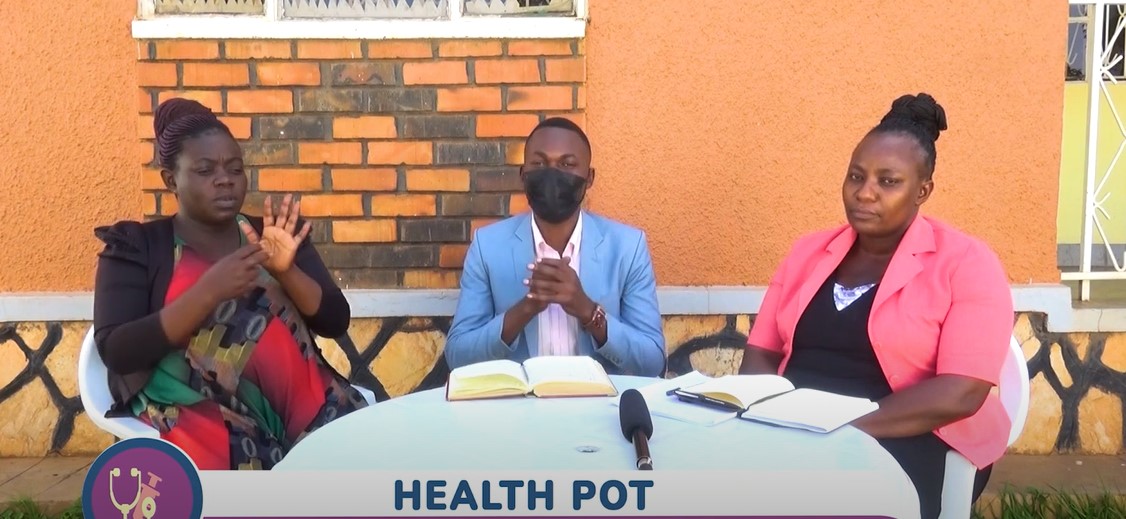
Show Host: What do you mean by alternatives?
Justine Lubanga: Initially embracing technology has not been there, in that when a child is declared having a hearing loss then they send them to schools for the death. Now we realize that with upcoming technologies there are avenues where hearing can be reverted through the use of cochlear implants and hearing aids. It is not just that when you have a cochlear implant, that is the end of it all.
Show Host: I thought when it is inserted you are good to go.
Justine Lubanga: No. That is where many people get it wrong, they think this is a miracle that has happened and that it is the end of it all. The journey is just beginning to hear for life. Once you acquire a cochlear implant you get to start the process of rehabilitation which explains the center's role. The child is taken through comprehensive rehab by getting speech and rehabilitation but also getting an education. The education component is important because we want the child to be supported to develop speech. Language is also learning the different innate skills as far as counting, in as far as speaking English, communicating with others, in as far as how do you relate.
Show Host: At the end of last month as we were looking at the International cochlear implant day we were in this place and we interacted with some children here and when we asked them and they responded. The question is, "How do they learn English? how do they learn what they speak?"
Justine Lubanga: They learn because one of the things we emphasize communicating, talking we don't use sign language while here. We can use gestures to emphasize a point but our main focus is talking. The reason why we do that is that we want these children to learn to utilize the gadget, the cochlear implant because now the cochlear implant becomes their ear, and now the journey of hearing for life begins. They are empowered to take care of that gadget because it has dos and don’ts, they are empowered to ensure that the gadget stays on for many hours until when they are going to sleep or when they are going to shower. But otherwise, they need to remain in touch with the rest of the people.
Show Host: That means that hearing shouldn't be stopped.
Justine Lubanga: Even when you are sleeping you hear a knock and you are like ...wait a minute, you hear a bell ringing and you even wake up-why do you ever stop hearing? it is very critical to take them through several rigorous exercises in terms of structured therapy and also group therapy. Why do we do group therapy? Kids learn through others-another one will hear somebody saying “come” and the other one will also say “come” -that's how talking begins, you imagine the time you were born and your mother is putting you on the breast-ooh you want nyunyuu (breast milk), do you respond immediately?
Show Host: No.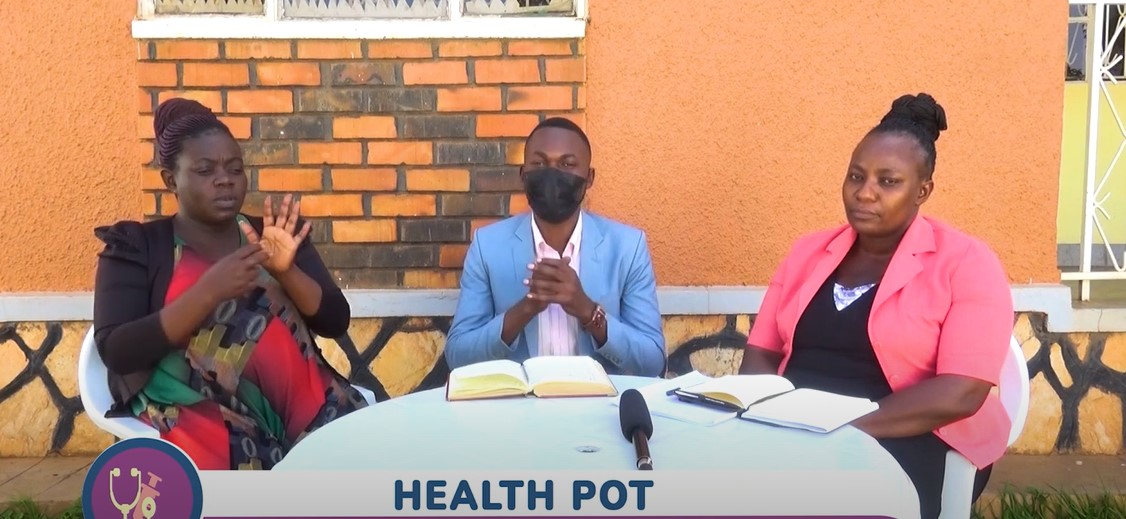
Justine Lubanga: You don't respond but you show signs, either by smiling and that's where it begins.
Show Host: So, in other words, the stages of speech development this child missed while they were still at a tender age are the ones that you introduce at this level.
Justine Lubanga: Yes, we introduce them at this level and so we grow them process by process as the word is normally used.
They are naive and their brains are waiting to receive, and the more you pump a lot of the words in their brains you allow the cochlear to process through sending to the brain so that the brain processes the information and feedback are given. That’s why we emphasize the early interventional programs whereby children need to be screened as early as possible when the child is born.
Show Host: Can you tell that my child will not be able to speak when they are 2 or 3 months?
Justine Lubanga: You see when a child is born, tests are supposed to be done as far as their hearing and seeing are concerned. One of the programs Hear his Voice has engaged the Ministry of Health to do newborn screening and we are happy to say that the Ministry of Health responded with happiness and they issued a directive to have newborn screening done at the regional level, National referral level and at District level. The directive helps parents to know the status of their children as far as hearing loss is concerned so that they seek proper intervention early enough. Remember there is a time when a cochlear implant is not going to help.
Show Host: I thought that at any stage it can be implanted.
Justine Lubanga: No, actually in Europe beyond 4 years they don't do an implant, actually beyond 3 years. So, an implant is supposed to be gotten from 0-3 years so that a child grows to learn to communicate normally, as she is breastfeeding the mother is talking to her and she learns, and with time she learns without really saying "sit here we are going to do this" In Uganda, we have children that have been implanted at 7 years but that is why it requires vigorous rehabilitation.
Show Host: I believe very many others will still be implanted because people didn't know that there is something that can be of rescue, people thought that the moment your child doesn't hear that you take them to the school of the deaf and that is how they will be forever, so they are only learning these new things.
Justine Lubanga: And that's why you’re coming here is very important, critical, and timely to spread the gospel out there that there are remedies that can be tapped into. There is a technology that can be tapped into to enable our children, you know have the potential to compete in this world, attain education and be surgeons, what is wrong with that?
Show Host: Nothing.
Justine Lubanga: There is nothing wrong with it if a child can join a mainstream school and compete with others.
Show Host: Well, I want you to draw for us a connection between hearing for life and listening with care.
Justine Lubanga: Hearing for life is like I said the process for those who have hearing loss the process of acquiring technology using technology to hear so that they can build their innate listening skills, to develop speech and language for their ability to attain education so that they can add value to this country and in the long run it will save the country a lot of monies and as a result, our economy will grow because we have people who can sustain themselves.
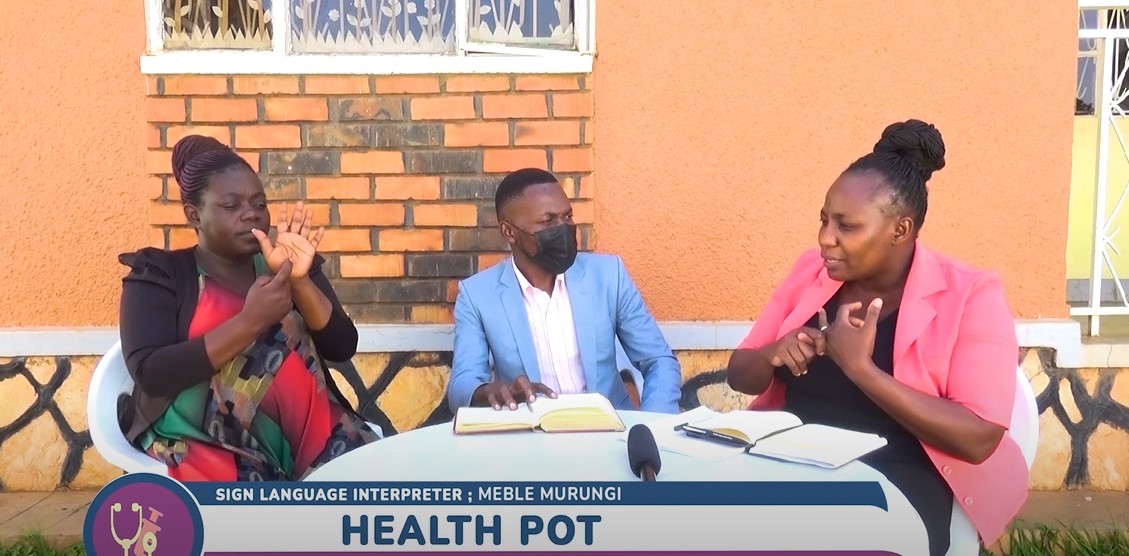
Show Host: And then, that is hearing for life, and then listening with care connecting with hearing for life because we all know that hearing is continuous, it should stop, and then where does listening with care come in.
Justine Lubanga: Now listening with care is where we support children to develop speech and language. We use different strategies and approaches, and one of the approaches that evolve with listening with care is "AVT" which is Auditory Verbal Therapy. Auditory involves hearing because when you hear you are interested when you hear you stop, so you listen and when you are interested in that conversation you listen with care. That’s because `there is something you want to hear and there is the feedback you want to get so AVT comes in handy to bring meaning to what we call hearing for life.
Show Host: Wow!! Let's take a short commercial break and when we come back, we are going to continue with AVT, there is a lot you need to know about the AVT, we shall be right back after the commercial break.
Show Host: Our dear viewers welcome back from the commercial break. This is Health Pot brought to you by Makerere University School of Public Health together with Church of Uganda Family TV, where we look at maternal health, and early childhood development We are looking at hearing loss and before the commercial break, Ms. Lubanga had shared with us or had introduced to us what we call the AVT, the Auditory-Verbal Therapy. We are here with Jacenta Namugga, a speech therapist who is going to take us through a detailed session of what the AVT and I believe you will be blessed by the end of the particular program. Jacenta, we are delighted to have you.
Namugga Jacinta: Nice to have you too.
Show Host: Kindly greet them since they are seeing you for the very first time, and then we proceed.
Namugga Jacenta: Hello our viewers. Nice to be here and I’m delighted to share with you about World Hearing Day. We know that more information and sensitization is going to happen out there about hearing impairment.
Show Host: True. Jacenta, we want to talk about Auditory-Verbal Therapy because Justine had introduced it but we want to get a detailed definition of what it is so that our viewers out there will be blessed and come to know what it is.
Namugga Jacenta: Alright, thank you very much. Auditory Verbal Therapy is a kind of therapy that we use with children with hearing impairment. It is so different from speech therapy because the strategies that the speech therapist uses are different from the strategies an auditory-verbal therapist uses. In auditory-verbal therapy, we guide and coach the parent to work with their children as the primary facilitator for their children to develop listening and spoken language.
Show Host: In other words, it is more of training the parent and not the child.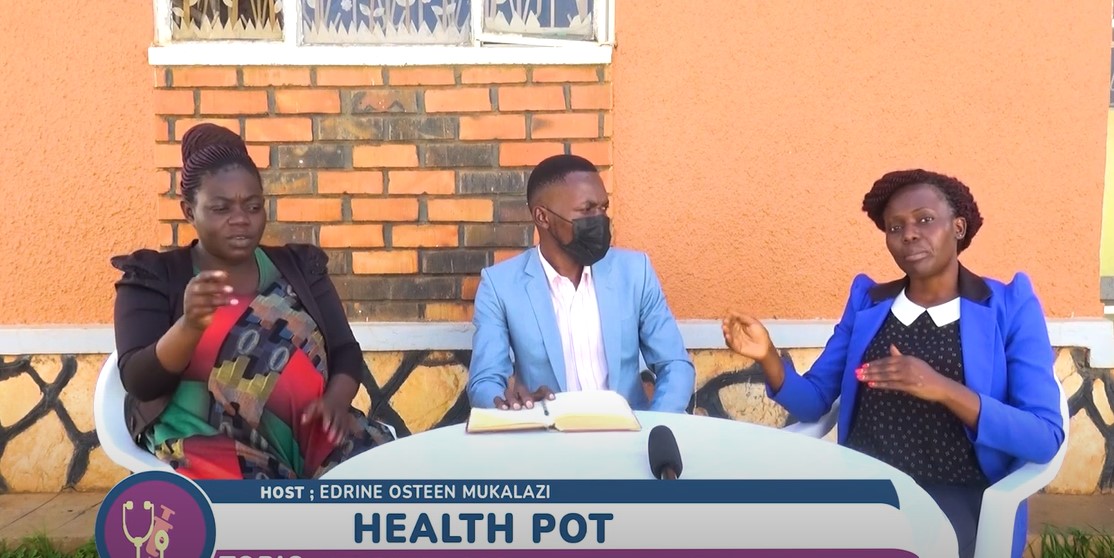
Namugga Jacenta: Not the child. The reason is the parent spends most of the time with their child than us, you know however much they come for rehabilitation, time is not enough for us. The home environment is where everything happens a typically developing child goes to school when they already know something that they learned from their parents and siblings. So, we emphasize auditory-verbal therapy coaching for the parent who is going to transfer these skills and work with their children.
Show Host: What are the benefits of this therapy?
Namugga Jacenta: When the child is engaged in this kind of therapy, they are going to develop auditory skills/listening skills and start to communicate using spoken language not sign language. The child is going to learn to use spoken language to communicate with anyone around them because as time goes on through this program of auditory verbal therapy, they start picking up words and eventually they become independent. When they have the implant, they also hear themselves and this makes their speech much clearer, so those are the benefits.
Show Host: African parents are a bit rough sometimes. They will bark at this child when the child has done wrong, isn't this a bit harmful to this child who is just learning speech?
Namugga Jacenta: Well, you know in our African culture some of these things we take them like they are normal. As a parent, you need to know that there are things that you cannot eliminate from the child's bringing but sometimes it is good for them to hear those different intonations in our voices. The barking will already automatically indicate to them, send signals that my mum is angry with me, it is different from you saying ''ooh, my baby''.
Show Host: What if I calmly respond "No, this is wrong", "do this again"?
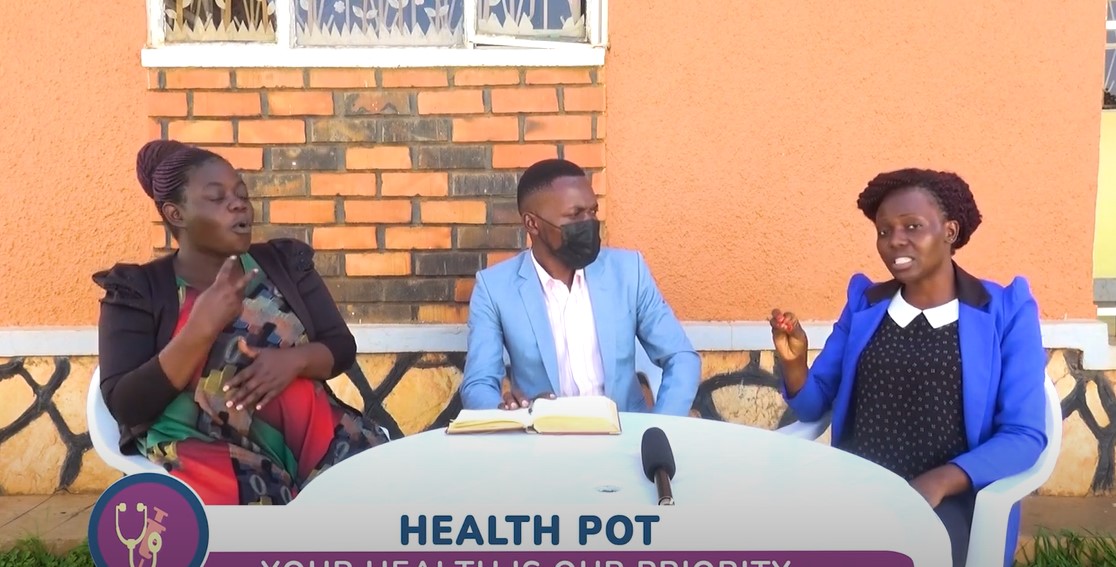
Namugga Jacenta: That is also another thing because the way you bring in your voice tone versus the other tough one shows the comparison. This is all developing the auditory brain of this child and so we call them in this therapy which we term "suprasegmental features. There is the high pitch, the mid-pitch, and the low pitch so when this child can listen to those different suprasegmental features, it also helps them in their learning to speak. They can also use a tough voice when it's appropriate, use a calm voice when it's appropriate, and a very easy voice when it's appropriate. So, it is so good for them to hear all these because they are important.
Show Host: We also have another problem where the child has a normal hearing capacity or they have an impairment and there are just learning the hearing like what you do here-the rehabilitation and then parents who think their children cannot pronounce some words and so they funnily pronounce them. Can’t this affect this child's speech? Can’t this child pick the right pronunciation of this word? For example, if a child wants to say or if a parent wants to say "njakukuba" or I will beat you and instead they say "baa" like that, cant this affect this child, isn't this message that the implant will send to the brain?
Namugga Jacenta: Usually you know there is what we call "motherese". There is a time when children are developing and you use such kind of babyish language like "baa maa" if it is hot but as a child grows, you change that language to the right language. You are supposed to use, "njakukuba" instead of "baa" because you know now the child understands much better than when they were young. Therefore, it is the same thing if the child has just received an implant, we consider them like a newborn child so it is okay to use the motherese to talk to this child.
Show Host: Irrespective of the age when they get the implant?
Namugga Jacinta: Age doesn’t matter, you’re now considering the time they have been implanted and switched on. That's the day they start listening as a newborn and the language you use can also matter. The time comes and you change your language now you know that your child has advanced in the language you can change up to now "njakukuba" and now they start attaching the meaning to that same thing as "baa" to njakukuba.
Show Host: How long should a child get this therapy?
Namugga Jacenta: There is no specific period for every child just like we have been told that early intervention. So, when the child has been early diagnosed and early intervened with, it helps their development or their prognosis is a bit much quick, a bit faster to catch up and learn everything. This is because their brain is very ready to learn and process and we have to know that the critical age of language development is 3 years. That's why we emphasize early diagnosis, after 3 years.
We have been implanting in Uganda but it takes a lot of work, so it doesn't matter. If this child has been implanted at 1 year, then you will expect a good prognosis with this child to capture up very fast depending if the family is engaging with the child. As I told you earlier, we work with the family, the parents, and the caregivers to train or work with their children but if this family is not engaging with the child, the child will not be benefiting. They will be coming to us as the therapist and we do what we must do, but at home, it's different. You will not see any difference so the child will take a long period but for families that are engaging and consistent in therapy and practicing what we do, it's usually quicker especially if the intervention was early enough.
Show Host: We also have parents who will say they don't spend that much time with their children. When they bring their child here and they spend the whole day and the parent comes for them in the evening after they get home, they eat supper and sleep so there is no engagement. Do you provide this as an additional service?
Namugga Jacenta: At home?
Show Host: No, while they are here at "Hear his Voice".
Namugga Jacenta: Well, you can't say you have no time because of even during bedtime.....
Show Host: They are working, they wake up at 5:00 am and come back at 7:00 pm.
Namugga Jacenta: You leave alone working, you know I know working happens, you need to look for money and all that but every moment is a learning moment. Bedtime and dinner time alone is a language development time so don't wait for a sit-down time alone to talk to your child. Use the home routines that are happening-diner time, bathing time, sleeping time, dressing up time in the morning preparing to leave home. Even when you are driving your kid to school, talk to your child. I am trying to say is all it takes is talking to your child
Show Host: Our last question is if a child has gone through this therapy and we assume they can ably speak and hear, can they be in a school where the other people without impairments are, and they achieve together with them?
Namugga Jacenta: Yeah. I am very positive because we have taken some in schools already and they are doing well, but our role is to follow them up in their schools and talk to the teachers about which strategies they are going to use to teach them better. This is because there is just sending them to school and then you don't follow up, the teachers will not know how to handle and they will not be benefitting. So, we continue following them up until the teachers know how to handle this child with hearing impairment using technology. 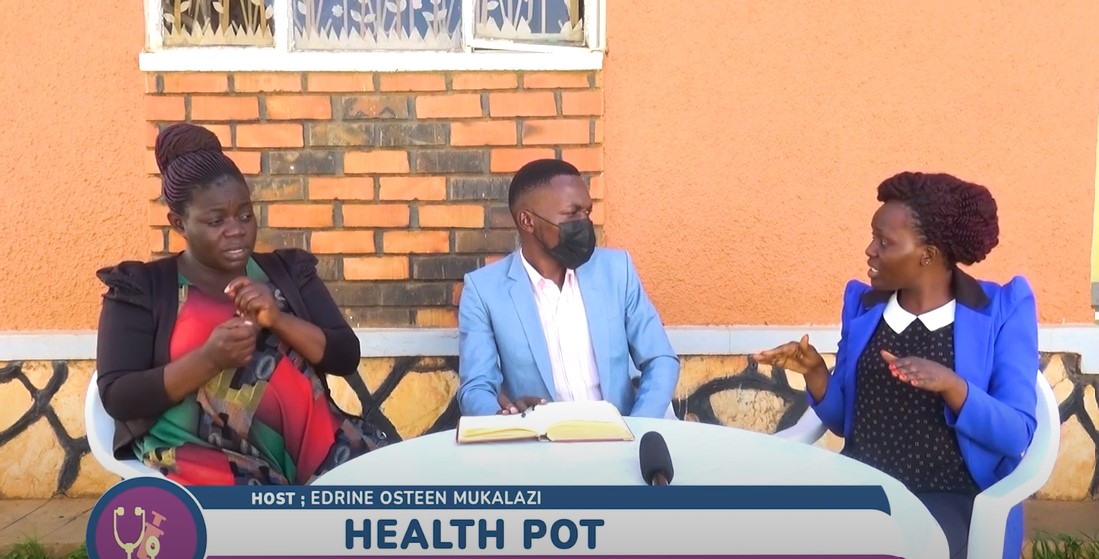
Show Host: Well, thank you so much, Jacenta. We are blessed. There are no more compromises, everything is in place for you to be helped, so don't sit back and worry about your child’s hearing loss.
Thank you so much for watching today's episode. We are delighted, we are blessed and we are still here at Hear his voice Uganda as they are still creating awareness so that by the end of this month, we believe very many families will be helped because we are a Family TV.
Edrine Osteen Mukalazi is my name, Health Pot is the program brought to you by Makerere University School of Public Health together with Family TV. We were with Justine in the first part of this show and Jacenta Namugga, a speech therapist, and Marble Murungi our sign language interpreter.
Contact Persons:
Dr. Christine Nalwadda (Team Lead) | 0772495169 | cnalwadda@musph.ac.ug
Mr. Davidson Ndyabahika (Comms MakSPH) | 0706765767 | dndyabahika@musph.ac.ug

